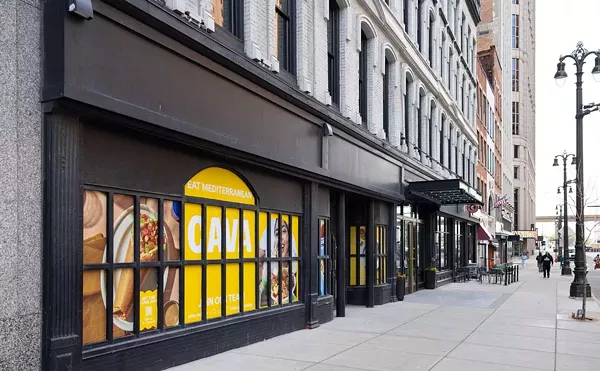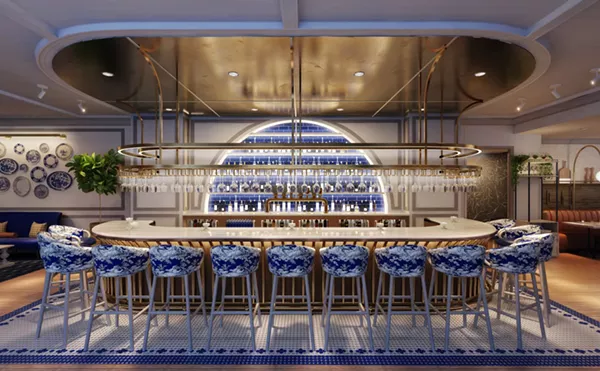Wyandotte's Cheesesteak Institute of America is a franchise-ready conceit

Audio By Carbonatix
[
{
"name": "GPT - Leaderboard - Inline - Content",
"component": "35519556",
"insertPoint": "5th",
"startingPoint": "3",
"requiredCountToDisplay": "3",
"maxInsertions": 100,
"adList": [
{
"adPreset": "LeaderboardInline"
}
]
}
]
A sandwich isn't always a sandwich. No, we're not talking about those dainty creations described as "wraps" or "rolls." Nor are we discussing those mass-market, chain sandwiches assembled to order behind a sneeze shield. When we say "sandwich," we're talking about food for the working man. A sandwich is a sandwich! An imposing, deli-style Dagwood. Out East, they're called by such masculine names as "heroes," "grinders," or "hoagies." In these parts, they're usually called "submarine sandwiches," or "subs," conjuring images of marine warfare. And in metro Detroit, these weapons against hunger can range up to a four-meatball sub with melted cheese, carrying a payload of enough calories to demolish a man-sized appetite. (That said, unless you mix cement for a living, these foods are best enjoyed as occasional delights.)
No arsenal of belly-busters would be complete without the formidable Philly cheesesteak sandwich. And the way metro Detroit's food has long rested on a bedrock of meat and potatoes, you'd think finding a good Philly cheesesteak should have been an easy task in our town. Surprisingly, until about a decade ago, no authentic version seemed to draw a vocal following. That seemed to change in 2005, when Joey's Famous Philly Cheesesteaks burst onto the culinary scene in Southgate. Soon, even Philadelphia natives were hailing it as the real thing.
Now, another Downriver eatery is making its cheesesteak bid: Wyandotte's Cheesesteak Institute of America. The franchise-ready conceit is that the Cheesesteak Institute of America is "the CIA," down to a logo resembling the federal department — and the espionage-themed movie posters on the joint's walls drive the point home. So does the menu, presenting the various dishes in an intelligence context, with such headings as "Special Forces" and "Auxilliary Operations." The signature sandwich's optional toppings are dubbed "Support Troops."
It's a bit of homespun marketing, which makes good sense when you consider this is a family business that originated in a trailer. Now a brick-and-mortar enterprise, the eatery's gimmick lives on, but the "CIA" thing only dates to 2008. For decades before, the food trailer was known as Geoffrey's Cheesesteaks, run by Greg and Cindy Arnoldy, and has been a fixture at local fairs in Wyandotte, Trenton, and Allen Park going back to the 1980s. The Arnoldys opened the store over Labor Day weekend last year, in the space formerly occupied by a coffeehouse called the Grind.
For a working-class sandwich, there's a surprising amount of snobbery about cheesesteaks. What kind of cheesesteak topping is legit? Some argue in favor of provolone. Others demand American cheese, usually white. Some are loyal adherents of Cheez Whiz. Are the onions finely chopped or left a bit stringy? Any one of these topics can be hotly debated among real fans, but don't be intimidated. The ultimate verdict comes from the individual palate. We've even seen people unapologetically drench the sandwich in ketchup.
The standard cheesesteak at this Wyandotte shop comes with white American. Ask at the counter, and they'll gladly substitute squeeze cheese. They don't offer provolone. The onions are left a bit stringy, but not so long that they'll dangle from your mouth after a bite. The meat is your standard thinly sliced rib-eye steak, scrambled, but if you want it more on the intact side, they should be able to oblige.
The cheesesteak is sublime. It's amazing how a pan-fried steak, caramelized onions, and a bit of squeeze cheese can mix and swap flavors, becoming exponentially greater than the sum of their parts. One newcomer to the sandwich was delighted by the way the mild white American cheese and aromatic fried onion had their way with the chopped steak, comparing it to beef stroganoff. Dairy improves humble chipped beef, but it exalts rib-eye.
The bread is what's hardest to get right: Only a few Philly bakeries specialize in the roll. Our roll was mostly legit. It didn't get soggy, and it never got sloppy, but it lacked that bit of crispness on the outside you hope for in a Philly cheesesteak. Then again, they wrap them up so tightly the bread might be softening under the hoagie's own steam. Open yours immediately.
Or you might forgo the bread altogether by ordering the even-more-calorie-laden $6.99 "CIA fries," a take on chili cheese fries in which the guts of a cheesesteak sandwich are sacrificed on a bed of waffle-cut fries. That sandwich did not die in vain: The structurally superior waffle fries remain crispy enough to withstand this onslaught of cheese, steak, and onion. Start with a fork, but you'll soon be munching on half-covered waffles still crisp to the bite.
The CIA offers two house condiments, a pepper relish and a red sauce. The red sauce is much like ketchup, though with a vinegary kick and a hint of spice. The pepper relish is something else, a slaw of hot peppers that's much like an Indonesian sambal. If you need that extra bit of oomph to make this manly sandwich that much more macho, be sure to ask for it. Apply it sparingly; it's strong.
The menu's "Standard Issue" sandwiches are just that: acceptable renditions of submarine sandwiches, appropriate for the diner in your group who simply can't handle all the steakitude. They offer tuna, turkey, veggie, and Italian. There's even a chicken-based hero made just like a Philly cheesesteak.
But why go halfway, after all? If you're going to a place where rich fair food is the house specialty, and an authentic rendition at that, it's best to go whole hog. (And then go jog!)
The space gets a fast-food feel from the soda and condiment stations, but they will bring orders to your table. It's all polystyrene and butcher paper, with plastic silverware. And yet, in spite of the tile floors and low-tops, it has a cozy feel, perhaps a leftover quality from when it was a coffeehouse. The service is bright and cheery, that of a family business used to taking its show on the road, and they still do. More to the point, they currently do deliver, and customers can call for curbside service.
Michael Jackman is managing editor of the Detroit Metro Times.





